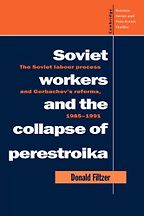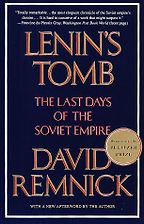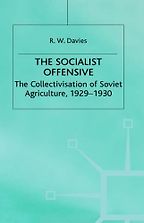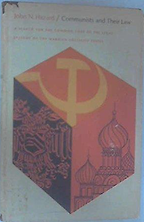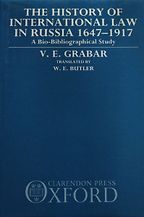Tell me about the Donald Filtzer book, Soviet Workers and the Collapse of Perestroika.
Basically, during the time of perestroika, there was a lot of discussion about whether or not perestroika had always been inevitable, whether the collapse of the USSR was inevitable from the beginning, and, also, what Gorbachev had been trying to achieve with perestroika. People looked at this from a legal point of view, and from a macro-economic point of view, or from a global political view.
Filtzer had already been writing about the legislation relating to the Soviet worker, with his first two volumes on labour law covering the Stalin and Khruschev periods respectively. He’d written Soviet Workers and De-Stalinisation and this book completes the third in his trilogy. The reason why it’s absolutely brilliant is basically because he analyses what it was like to be a worker in the Soviet Union in 1985. At that time Soviet workers had virtual security of employment, there was little labour mobility, workers were guaranteed a job, you didn’t do any work, you got very little pay and you had no stake in the running or success of the business. “We pretend to work and they pretend to pay us,” went the joke at the time. Filtzer gives you a picture of a legal regime that provided the backdrop and incentives for this type of behaviour. You ask why the Soviet Union had problems! You don’t need to look at the macro-economics. You just need to look at the Soviet work and the so-called “job” they were doing.
Filtzer goes through and looks at the legislation of the perestroika period as a way of trying to get round the problems in the labour market, trying to incentivise workers to do, basically, what we do anyway – work hard and have the right to receive a salary that is linked to performance – while at the same time struggling with the encroachment of “capitalist” principles of “unemployment” and “unequal pay”. People ask what perestroika was about – glasnost, political freedom, openness, independence for Eastern European states? But at its most basic level, in the economic sphere, it was arguably just about getting the workers motivised and incentivised – democratizing the workplace by giving back to the worker the economic freedom (and rewards that go with it) that was seized by the state in the late 1920s with the nationalisation of the industrial economy and state planning – ideally without the whole system collapsing. He looks at the period 1985-1991 and goes through each attempt to create labour markets, the attempts to democratise the workplace with labour collectives, the end of price controls, self-financing companies with their own budget, and how it all ultimately failed and how it continued to fail, in essence because in 1991 the state still owned all the major enterprises and stepped back from more radical solutions. Unless you can give full ownership back to the worker and give him a stake in the economic success of the company, how are you going to incentivise the factory manager to skip the holiday he feels he’s entitled to in order to finish off that critical summer project?
Why doesn’t this work? Why isn’t the common good and building a better world any kind of incentive?
Well, maybe on the barricades in 1917 it was. Indeed the Soviets did believe that they were creating, through law and their political environment, a “new type of man” – homo sovieticus – a collectivist working for the common good. But after you’ve watched all your friends die in wars and famines you might think differently. And by 1970, obviously, you’ve just had enough. Inertia creeps in. You’d ask someone what kind of place they lived in and they’d say either a one- or two-bedroom apartment and you knew exactly what it looked like because all one-bedroom apartments were absolutely identical, as was the case for the two-bedroom variety – there was in fact a comedy film made about this in Soviet times.
You might not intuitively read a book about Soviet workers and labour law, but this book is compelling for anyone who is interested in why the Soviet economy was in such a a dire situation, and how the political leaders struggled to change things within the limits of the prevailing Soviet ideology. Why are there problems in the economy? Why are we in this mess? Because individuals are acting in a particular way. A fixed salary, targets you pretend to meet, no incentive – no wonder!
The Remnick book, Lenin’s Tomb, is more mainstream.
Yes – that’s why it’s on my list. While Soviet Workers is one of those books that probably needs to be recommended by someone in the field, Remnick’s book is a paperback you might otherwise pick up at an airport for a holiday read. It is a brilliantly written book about life at the end of the Soviet Union by someone who was there. If you want to know what the Soviet Union was like and why it was in crisis, this book will tell you. It’s a page-turner too, written as a journalist writes, doing interviews, going to meet people; it’s about riots, racism and the struggles people were going through at that time.
If you’re not that interested in the intricacies of Soviet law but just want to know what it was like, this is what it was like. You read it and think: “Yup. That’s what it was like. Grim!” The other thing here is that he captures the optimism of 1991, the end of the Soviet Union and Boris stepping forward as the liberator from the evil empire – but that’s where the book ends. And yet we know what happened next. But ultimately you can’t get away from law, as Remnick reminds us in his final sentence: “In 1991, the Constitutional Court of Russia then ruled that the national Communist party was illegal. The Soviet era ended in a court of law.” Not a shot fired. Nobody killed. After that, you just thought – anything can happen in this world.
And now the R W Davies book on the collectivisation of agriculture in 1929.
This book picks up where E H Carr’s great history, The Bolshevik Revolution, leaves off. Carr’s history comprised 14 volumes, covering the period 1917-1929. Davies took up the baton by adding five more volumes, taking us from 1929 to1933. These five volumes deal with agriculture and the wider economy. Each of the five is a masterpiece of detail and research, providing an incredibly detailed picture of the history of the time. Just to give you an idea, Volume IV is on economics from 1931-33 and it alone is 612 pages long. This series is simply remarkable, compelling, fascinating, and genuine historical scholarship on the industrialisation of Soviet Russia. You have the feeling that you are actually living through each month of the early years of Soviet power, living with the struggles, living through the huge human and economic cost, living with the consequences of top-down-command-economy decision-making and legal implementation. He goes through the archives and examines what really happened.
The volume I’ve chosen is the first of the series, on collectivisation. Davies has a huge understanding not only of the politics and history of the time, but also of the law. This whole book deals only with the legislation for collective farming 1929-1930, the early years of the collectivisation of Soviet agriculture. Each chapter chronologically covers a few months taking you through the decisions, the debates and the terrible implications for Soviet farmers of the time and the traditional world in which they had lived for many years. You read about the food shortages and early ideological arguments that prompted the drastic step of forced political and legal collectivisation of agriculture.
He shows how law was used as a pretext for going to the countryside and expropriating grain, how it was used as an engine for change from peasant subsistence farming to mass collectivisation. In March 1929 the notorious article 107 of the criminal code in 1929 was widely applied to those hoarding grain. You got three years’ “deprivation of freedom” for the crime of deliberately increasing prices by “buying up grain” or by “not putting it on the market” (ie, delivering it to the government) and you were also subject to “full or partial confiscation of your property”. And yet everybody was hoarding grain because the state was seizing as much as possible for the towns, there was nothing otherwise to eat and you feared for your next harvest or supply of grain.
What about the Hazard book, Communists and Their Law?
To my mind this is one of the best books written about Communist-era law. John Hazard was at Harvard Law School and in the 1930s he was selected to go and study Soviet law in Russia at the Moscow Juridical Institute. Later he returned to become an adviser to the US government before going into full-time teaching of Soviet law at Columbia University for over 30 years. I mean, nobody was out there in Russia studying law in the 1930s! He was a pioneer.
Until the demise of the Soviet Union in 1991, everyone who worked in Soviet law had discussions about whether or not Soviet law actually constituted a “new kind of legal system”. Why should anyone care whether it was a “new kind of legal system” or not? A debate about classification – is that worth anything really? Well, the answer is firmly yes – in particular for the Soviets. Classification was important because the Soviet revolution (like the French and American revolutions) was essentially an ideological revolution – about ideas, about alternatives to the way we live our lives, offering a vision of a better world. And so it was important not only that Soviet law did present an alternative but that it was recognised as doing so.
As such, Soviet jurists debated hotly whether Soviet law was just a form of legal system dating back to Roman law, through Napoleonic law, or whether it was a “new legal system”, challenging both the previous Roman law system (of which Russia was previously a part) and other existing legal systems such as the common law system (like we have in England) or religious law-based systems.
Now a key feature of the Roman law system is that these systems are based on codes (rather than on court decisions with a strong doctrine of precedent like we have in England or the US) – and the thing is that Soviet law also had codes dating back to its earliest days. Hazard makes the case here that the statutes of Soviet law comprise a new legal system in their own right. Until now there were really three main systems of law: Anglo-American, Romanist (like the Napoleonic) and Islamic. Now there was also the Marxian-Socialist system. This last, Hazard argued, was a new competing legal system. They really believed that this was a new system of law that would last for thousands of years, that they were pioneers of a new legal system. In 1967, the books publishing the collections of Soviet laws would read: “The Collected Laws of the USSR 1917-1967 – The First Fifty Years.”
There were all sorts of reasons for viewing socialist law as “something different” – the polity was run by “the party”, the state owned the entire economy directly (including all farms and enterprises), and ran things in accordance with a plan, the separation of religion from the state (ie, making state marriages – and divorces – a civil affair), a strong criminal code, and workers’ rights and obligations. This at the same time gave rise to very different points of detail in each of these areas, reflecting the distinctly socialist ideological imperative – for example, the first civil code provided that the civil code should be interpreted to enhance “the protection of the interests of the workers of the state”; crimes were defined in the codes as “socially dangerous acts” including by omission; and, in the early days of Soviet power, inheritance was totally abolished, well other than for deceased male workers whose families might otherwise be destitute.
If you want to understand how a Marxist country worked, you pick up this book – a great introductory overview to the strange and interesting parts of the law of that time. The sad thing is that, arguably, it wasn’t that different really to Roman law and it didn’t last very long anyway.
Now the translation of Grabar’s The History of International Law in Russia, which covers the period 1647-1917.
Now this is not really a book to be read from cover to cover. This is such serious scholarship that it’s almost a work of art, to be held, consulted, dipped into. It is 750 pages long and if books were possessions, to own rather than read, this would have to be in your top five.
It is an astonishing piece of work. It was translated by Professor Butler, one of great professors of Soviet law. He is truly prolific in terms of his books, commentaries and monographs in the field. And while Butler’s books include those in the mainstream of the subject (Russian Law remains the leading academic work in the area), he has also translated and written on more specialised areas, including this work by Grabar.. It was published by Grabar at the dawn of the Soviet era and is a kind of anthology of all international law concerning Russia from 1647-1917. But this is a bio-bibliographical study of international law from a Russian perspective – as such it provides the reader with short biographies of every material international jurist, diplomat, adviser in the field during this period, covering the names of Peter the Great’s academicians, life histories of Catherine II’s diplomats, right up to the officials of the Ministry of Foreign Affairs in Nicolas II’s Russia. He covers the legislation, sure, but it’s the attention to the individuals that is so amazing.
As Professor Butler notes, Grabar’s book is the “golden key” for international lawyers and diplomatic historians but he goes on to acknowledge that “for all its virtues the Russian edition is exceptionally difficult to use”, especially given the short-hand way that footnotes and citations are scattered and provided. As such, Butler has not only translated this work, but also independently verified literally thousands of the citations and locations, providing them in an accessible way and removing “ghost” references. In addition, he includes for the first time a more comprehensive biography of Grabar’s works drawn from the Tartu University archives. This may be one example where the translation is in fact an improvement on the original – or at least on the readability of the original!
What is the point of all this now? Is it just a history lesson?
Well, I think the first message of Soviet law is that you can’t study law just from books. Soviet legislation was phenomenal – human rights, apartments for everyone, freedom to marry and divorce at will, guaranteed jobs, fixed prices… but then you walked through the magic curtain and found yourself in what was basically a gulag! There are a lot of dictatorial systems but this was one that people really believed in. That people still believe in! So, I think, you can’t just pick up legislation and read it or just switch on the TV. The onion needs to be peeled – you need to see how it worked in practice and all the books in this list do that..
But it’s sad in a way.
The demise of the Soviet Union was the demise of a country underpinned by a concept, an ideology, an alternative vision – socialism. It was an evangelical empire posing questions about how best to manage an economy, the extent to which the state provides social welfare, the scope of human rights and the importance of the arts and science. That said, it was also an empire with a darker side. But since 1991 it seems like we have lost something when it comes to politics – lost the enthusiasm to debate about the bigger questions and to worry about whether there is a better alternative – ideology seems to be missing. The mere existence of the Soviet Union almost seemed to provide a counter ideological force that helped us to question and frame the nature of how we in the West choose to live. And the Soviets did it in a vaguely credible way – and so, while the battle for liberty was won in 1991, it seems that the nature of that liberty somehow misses now an important element of radical choice and debate that was posed by the Soviets.
Five Books aims to keep its book recommendations and interviews up to date. If you are the interviewee and would like to update your choice of books (or even just what you say about them) please email us at [email protected]
Five Books interviews are expensive to produce. If you've enjoyed this interview, please support us by donating a small amount.
